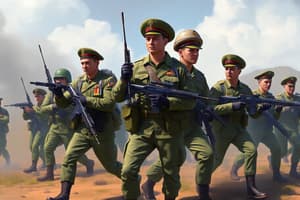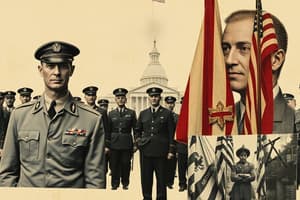Podcast
Questions and Answers
What does leadership primarily aim to achieve?
What does leadership primarily aim to achieve?
- Inducing cooperation towards a common goal (correct)
- The unilateral execution of orders
- Establishing authority over subordinates
- Maximizing personal gain and recognition
What distinguishes a commander from a leader?
What distinguishes a commander from a leader?
- A commander must have superior intelligence
- A commander operates solely independently
- A commander leads by personal charisma only
- A commander is formally designated to direct a unit (correct)
Which type of leader relies most on the consultation of their men?
Which type of leader relies most on the consultation of their men?
- Authoritarian leader
- Persuasive leader (correct)
- Charismatic leader
- Situational leader
What is one of the basic elements of leadership?
What is one of the basic elements of leadership?
How is responsibility defined in a military leadership context?
How is responsibility defined in a military leadership context?
Which trait is associated with the ability to be observant and plan for the future in leadership?
Which trait is associated with the ability to be observant and plan for the future in leadership?
Which of the following does not correctly describe an authoritarian leader?
Which of the following does not correctly describe an authoritarian leader?
Which of the following is NOT a recognized leadership trait?
Which of the following is NOT a recognized leadership trait?
What is the primary characteristic of a leader's decisiveness?
What is the primary characteristic of a leader's decisiveness?
Which of the following best describes integrity in a leader?
Which of the following best describes integrity in a leader?
Which quality ensures that a leader is reliably performing their duties?
Which quality ensures that a leader is reliably performing their duties?
Endurance in leadership refers to which of the following abilities?
Endurance in leadership refers to which of the following abilities?
What qualities are necessary for a leader to exhibit enthusiasm?
What qualities are necessary for a leader to exhibit enthusiasm?
Which of the following describes the quality of justice in leadership?
Which of the following describes the quality of justice in leadership?
What does it mean for a leader to take initiative?
What does it mean for a leader to take initiative?
Which trait includes the ability to logically assess facts and make sound decisions?
Which trait includes the ability to logically assess facts and make sound decisions?
What is the primary advantage of keeping soldiers informed?
What is the primary advantage of keeping soldiers informed?
Which of the following is considered a key role of a leader?
Which of the following is considered a key role of a leader?
Which statement best defines esprit de corps?
Which statement best defines esprit de corps?
How does morale affect soldiers?
How does morale affect soldiers?
What essential quality must leaders instill in their teams?
What essential quality must leaders instill in their teams?
What does discipline ensure in a military context?
What does discipline ensure in a military context?
The role of a personnel manager includes which of the following?
The role of a personnel manager includes which of the following?
What does efficiency refer to in the context of military tasks?
What does efficiency refer to in the context of military tasks?
Flashcards
Courage
Courage
The mental strength to face fear, danger, or criticism calmly and firmly.
Decisiveness
Decisiveness
The ability to make quick, sound judgments based on available information.
Dependability
Dependability
The quality of being reliable and trustworthy in carrying out duties.
Endurance
Endurance
Signup and view all the flashcards
Initiative
Initiative
Signup and view all the flashcards
Integrity
Integrity
Signup and view all the flashcards
Judgment
Judgment
Signup and view all the flashcards
Knowledge
Knowledge
Signup and view all the flashcards
Military Leadership
Military Leadership
Signup and view all the flashcards
Leadership
Leadership
Signup and view all the flashcards
Commander
Commander
Signup and view all the flashcards
Command
Command
Signup and view all the flashcards
Responsibility (leadership)
Responsibility (leadership)
Signup and view all the flashcards
Authoritarian Leader
Authoritarian Leader
Signup and view all the flashcards
Persuasive Leader
Persuasive Leader
Signup and view all the flashcards
Leadership Traits
Leadership Traits
Signup and view all the flashcards
Reasoning under Pressure
Reasoning under Pressure
Signup and view all the flashcards
Keeping Men Informed
Keeping Men Informed
Signup and view all the flashcards
Team Training
Team Training
Signup and view all the flashcards
Esprit de Corps
Esprit de Corps
Signup and view all the flashcards
Military Discipline
Military Discipline
Signup and view all the flashcards
Leadership Efficiency
Leadership Efficiency
Signup and view all the flashcards
Leader as a Model
Leader as a Model
Signup and view all the flashcards
Study Notes
Military Leadership and Command
- Military leadership is the art of influencing and directing individuals toward a shared goal, ensuring obedience, confidence, respect, and cooperation within a unit to accomplish a mission.
- Leadership is the art of inspiring cooperation towards achieving a common goal.
- Leader - A person who influences and directs others
- Commander - The formally designated person directing a unit of any size.
- Command - Authority to impose legitimate will on subordinates based on rank. A squad leader's command extends to his team members due to superior orders. Responsibility comes with the authority of command.
- Command carries responsibility: Leaders are answerable for all activities within their command structure. Success depends on proper actions, making leadership the efficient exercise of command.
- Responsibility - The obligation to perform duties, fulfill functions, and bear the consequences of actions within one's command
Two Types of Leader
- Authoritarian - Leaders with authority make decisions based on rank and position through the dogmatic use of power.
- Persuasive - Leaders consult team members, set an example, and consider individuals' unique physical, mental, and moral capabilities and constraints
Basic Elements of Leadership
- Character - A leader must possess strong moral character (honesty, diligence, courage, self-control).
- Intelligence - Ability to quickly grasp knowledge, strong common sense, and sound judgment.
- Alertness - Ability to be watchful, observant, highly aware of their surroundings, and to strategically think and plan future actions to avoid problems.
Leadership Traits
- These are human characteristics enabling individuals to lead. These are personal qualities invaluable to commanding personnel. These traits can be developed through self-analysis and practice.
Leadership Traits (Continued)
- Bearing - overall appearance, behavior, and conduct of the leader.
- Courage - Recognizing and dealing with fear of danger and criticism using calmness and firmness.
- Decisiveness - Positive approach, minimal time waste, objective/timely analysis, consideration of opinions to facilitate decisiveness.
- Dependability - Consistent performance of duties; dependable leaders can be trusted.
- Endurance - Mental and physical stamina; withstanding pain, tiredness, stress & hardship is essential to ensure continuous performance.
- Enthusiasm - Demonstrating sincere interest and zeal in the performance of duties with optimistic and positive behavior.
- Initiative - Taking independent action without direct orders.
- Integrity - Uprightness, principled action, truthfulness, and honesty.
- Judgment - Ability to logically weigh facts to form sound decisions and solve problems.
- Justice - Treating all individuals fairly and impartially.
Leadership Traits (Continued)
- Knowledge - Acquiring knowledge related to the job and to individuals within a unit. Knowledge is power, helping gain respect and confidence quickly.
- Loyalty - Fidelity to the country and unit.
- Tact - Ability to interact with others respectfully. Leaders demonstrating tact encourage courteous treatment.
- Unselfishness - Leaders who focus on the needs of others. Avoid ego-driven actions, ensuring their personal needs do not impact unit goals.
Leadership Principles
- Know Your Job - Leaders must be professionally and culturally prepared, understanding all duties and responsibilities.
Know Yourself and Seek Self-Improvement
- Honest self-evaluation of strengths and weaknesses enables leaders to understand their capabilities and limitations, facilitating personal growth.
Make Sound and Timely Decisions
- Leaders must quickly and accurately assess situations to make prompt sound decisions. Leaders reason effectively under pressure and respond quickly to opportunities.
Keep Your Men Informed
- Keeping subordinates informed improves initiative, promotes teamwork, and boosts morale, reducing fear and rumors.
Train Your Men as a Team
- Issuing clear orders, monitoring their execution, and training personnel are key aspects of successful military leadership. Effective teamwork from the smallest unit up to the largest organization is emphasized.
Morale, Esprit de Corps, Discipline, and Efficiency
- Morale - The mental state of an individual influenced by their stance towards everything that affects them, colleagues, and leaders. Morale is connected to satisfying the individual's needs.
- Esprit de Corps - Loyalty, pride, and zealous devotion to the unit; reflecting the team spirit. Group solidarity and pride are promoted.
- Discipline - Attitude supporting prompt obedience to orders and proactive action in the absence of orders.
- Efficiency - Ability to efficiently and successfully perform assigned tasks in the shortest time with minimum effort and resources.
Roles of a Military Leader
- Model Soldier - Subordinates look up to the leader for emulation.
- Instructor - Focuses on the main objective in training (combat).
- Personnel Manager - Leader in charge of planning, coordinating, and directing personnel. Aiming for maximum efficient utilization of personnel.
- Commander and Supervisor - Leader in charge of receiving orders and then making estimates of the situation, formulating plans, commanding, and overseeing orders' execution (1% direction, 99% supervision).
- Custodian of Men's Welfare - Leader is concerned with personnel needs for comfort & wellbeing (supplies, quarters, recreation, sanitation).
- Counselor - Understanding how to interact with individuals and providing advice and support when necessary.
Studying That Suits You
Use AI to generate personalized quizzes and flashcards to suit your learning preferences.




